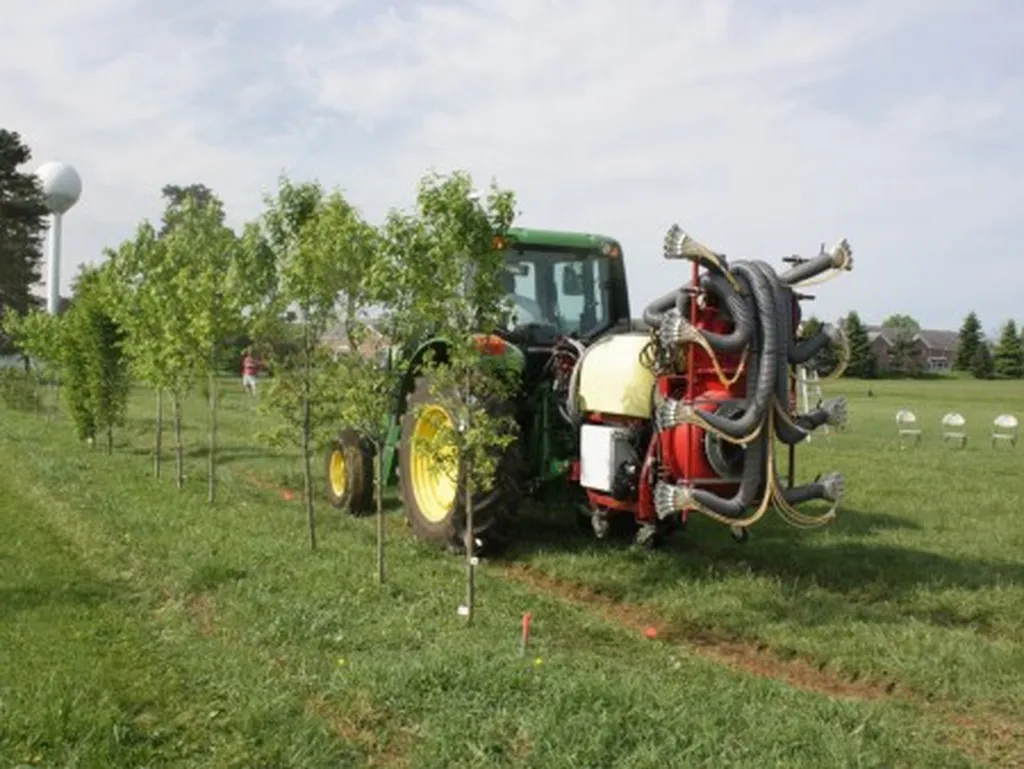In the heart of Ohio, a groundbreaking study is reshaping the way we think about pesticide application in agriculture. Researchers, led by K. You, a Research Agricultural Engineer at the USDA-ARS ATRU in Wooster, have successfully retrofitted a conventional air-assisted sprayer with a laser-guided variable-rate spray control system. This innovation, detailed in a recent study published in *Smart Agricultural Technology*, promises to revolutionize precision agriculture by significantly reducing chemical usage and environmental impact.
The study, conducted in a fully foliaged ash tree nursery, compared the performance of the new variable-rate mode (VRM) with the conventional constant-rate mode (CRM). The results were striking. The VRM system, which adjusts spray volume based on tree size, shape, and foliage density, reduced spray volume by 40.8–52.4% compared to the CRM. Despite this reduction, the VRM achieved comparable canopy deposition and coverage, demonstrating that less can indeed be more when it comes to pesticide application.
One of the most compelling findings was the significant reduction in ground deposition with the VRM system. “We saw a notable decrease in ground deposition, which means less spray loss and less environmental contamination,” said lead author K. You. This is a game-changer for growers who have long struggled with the balance between effective pest control and minimizing environmental impact.
The study also highlighted the uniformity of deposition with the VRM system. “The deposition was more uniform across canopy and ground locations, which is crucial for effective pest control and reducing waste,” explained You. This uniformity, coupled with the reduced spray volume, suggests that the VRM system could potentially reduce chemical usage by up to 50% while maintaining effective pest control.
The implications for the agriculture sector are immense. With the global push towards sustainable and precision agriculture, this technology offers a practical solution for growers to minimize pesticide waste and reduce environmental contamination. “This new technology would be greatly beneficial to growers to minimize pesticide waste into the production field and the environment,” said You.
The study represents an applied field validation of a laser-guided variable-rate intelligent sprayer under commercial nursery conditions. It demonstrates pesticide savings, deposition uniformity, and environmental benefits, providing practical evidence for the real-world adoption of a commercialized smart spraying system like SmartApply™ integrated into John Deere sprayers.
As we look to the future, this research paves the way for further advancements in precision agriculture. The integration of intelligent sprayers with other technologies, such as drones and satellite imagery, could lead to even more precise and efficient pesticide application. This could not only reduce costs for growers but also contribute to a more sustainable and environmentally friendly agriculture sector.
In conclusion, this study is a significant step forward in the field of precision agriculture. It offers a practical and effective solution for reducing pesticide usage and environmental impact, while maintaining effective pest control. As the agriculture sector continues to evolve, technologies like the laser-guided variable-rate spray system will play a crucial role in shaping a more sustainable future.

